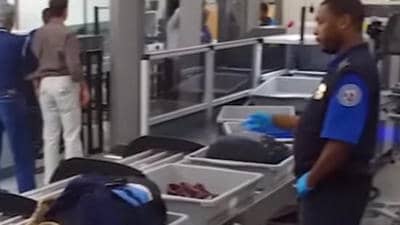
Since the shooting of unarmed black teen Michael Brown—and lack of indictment of the officer, who is white—sparked massive protests in Ferguson, the news has featured a seemingly constant stream of headlines about black men and women who have been killed by police or died while in custody: Walter Scott, Akai Gurley, Eric Garner, Freddie Gray, Samuel DuBose and Sandra Bland—and most recently, Alton Sterling.
According to The Washington Post, in 2015 alone, there have been nearly 400 fatal shootings by police. Many of them were people of color.
We recently spoke with Lisa Sharon Harper, Chief Church Engagement Officer and columnist at Sojourners and one of the authors of Forgive Us: Confessions of a Compromised Faith, about the string of police shootings, how our society can hold authority figures more responsible and how the evangelical church can help usher in change and racial reconciliation.
Do you think the problem of police violence has gotten worse recently, or do you think it’s something the media is just more tuned into?
Unfortunately, we don’t really know, because [we don’t have] good data. We do know that what is being revealed is horrific.
I think that the main thing I take from this is that police need to be more accountable.
As a young teenager on my way to college, my brother was actually pulled over by a police officer with me in the car and forced out onto the highway at 10 something at night on the New Jersey turnpike. [Most people of color] have all had this experience, so it was not at all inconceivable to us that a police officer would abuse their authority. Yet, within the evangelical church, there is this dark divide between how we interpreted Michael Brown and Eric Garner and John Crawford and now the scores after that.
If you’ve experienced it and everyone in your family has experienced it and everyone you know that is a certain hue has experienced it, then you don’t really need to wait for forensic evidence to say it’s very possible for police officers to abuse their authority.
Do you think these vidoes we’re seeing of incidents can help communities like white evangelicals come to grips with the problem?
Yes, I hope so. And I’m actually seeing that.
It has been frustrating to have such huge pushback from the white evangelical church, who has refused in many cases over the previous decades to acknowledge the depth and pervasiveness of racism and racial bias in our nation. There has been a washing over, a minimization of it.
But, over the past year, we have kind of taken a look into the pit and understood how deep the problem goes, how pervasive it is and how horrific the consequences are in daily life. I can’t even say with confidence that most evangelicals get it now, but there’s at least a conversation happening within the white evangelical church—a lot of searching and asking questions. We’re finally getting to the place where white evangelical leaders are realizing the limitations of their own experience and wisdom. That’s been a new thing, and it really was a product of the constant drumbeat of deaths over the past year.
It’s sad that that’s what it’s taken.
There needs to be deep, deep repentance for inaction, for being OK with not knowing. And even for defending one’s own worldview to the exclusion of the worldviews of others, because that has consequences.
If evangelicals were to say “No more” with the veracity, with the energy, with the conviction that the protestors do, stuff would cease tomorrow. Because not only are evangelicals the largest single religious group in America beside Catholics, we also tend to hold a lot of power in society. There are police chiefs who would be among evangelicals rising up across the country. There are police officers who would receive critique from our community as another step on the road of discipleship rather than pushing back against it, as if it’s a personal attack.
If we as the evangelical church said “no to one more death, not one more,” I really believe there would be deep societal change and an opportunity for coming together at just the moment when there’s a great threat of major divide.
What do you think is preventing the evangelical community from speaking out like that?
I think the thing that has kept evangelical churches from saying “No more” has been the reality of the distance from the problem. When I traveled to Ferguson and St. Louis a year ago, that city was on fire, but it really wasn’t the whole city that was on fire, it was Ferguson that was on fire. It was lit up with protests. They had cops down several streets blocking traffic, you had thousands of people flowing into St. Louis over the course of weeks in order to join the protests.
But 15 miles away, people were just going to Starbucks as if nothing was happening.
I think that there’s a proximity gap that is pervasive and really does keep evangelicals cloistered from the reality of life. That’s white folks, generally speaking, that are intentionally cloistered by where they live, by where their schools are. Those are intentional acts that separate realities and as a result make it possible for people to not pay attention.
So how do we change that?
The evangelical church has to grow in compassion. First and foremost, what that means is we need to engage in listening to stories and learning. And along with that is the call to humility.
Over the last year, there has been a severe lack of humility. I wouldn’t say that lack of humility has existed within leaders so much as it has existed most in the pews. I have experienced a lot of leadership trying to figure out how to move the white evangelical church forward in its understanding and practice of reconciliation. They get pushback from their pews, and these are the people who pay their paychecks, so they know they have to walk lightly.
There also needs to be a reckoning with history and a reckoning with the present.
How do you think we can hold authority figures like police accountable?
According to the Washington Post police body cameras have actually made the biggest difference over the past year. We saw that in the case of 43-year-old Samuel DuBose. They had a very swift process—nine days and that cop was indicted, and indictments don’t happen that often at all. Here you have [hundreds of] lethal police shootings over the last year, and only four were indicted, and this guy was one of them. You don’t get that result without the video.
I would also add one more: We need to push for a zero tolerance policy for officers with past or present connections to hate groups. Several officers across the country have recently been tied to hate groups either through chat room engagement or past membership. This should be a red herring for anyone given the ultimate authority—the legal authority to take another citizen’s life.
An earlier version of this interview appeared in late 2015. It’s since been updates and revised.























